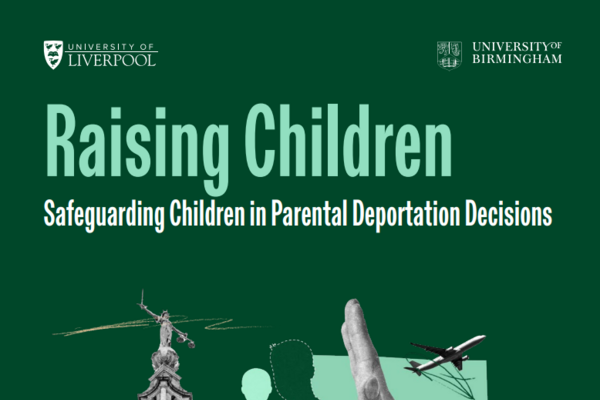As our team digest the Nationality and Borders Bill and its dire implications for human rights we join many others in expressing our extreme dismay at the proposition of such a cruel and unworkable immigration bill.
Having spent 20 years working with people in detention we are no strangers to Home Office policies that are cruel but this bill undermines the entire system of international protection.
The Nationality and Borders Bill will not achieve the stated aim of ‘fixing’ the UK’s asylum system or making it fairer. It will be practically unworkable, cause further chaos and delays at the Home Office and cause immense human suffering and misery.
Below we have chosen to focus on several areas of the bill that pose a particular threat to our clients. We invite you to subscribe to our mailing list to keep up to date with our work as we continue to get to grips with the Bill and organise against it. Make no mistake, the entire asylum system is under threat.
Before we go into more detail about our concerns, we felt that it was important to take this moment to express our gratitude for the outpouring of solidarity, resistance and opposition we have witnessed. While we sincerely feel the gravity of these proposals, it is a source of inspiration and hope to know that so many are coming together to stand against this bill. We have joined the Together With Refugees coalition and will resist these proposals tooth and nail bolstered by the knowledge that our incredible network of colleagues, volunteers and supporters stand with us.
Prolonging detention
Clause 45 would require decision-makers to consider previous ‘failure... to cooperate’ with certain immigration processes when considering whether to grant bail. Put simply, this is the Home Office seeking change the law because it has consistently been losing bail hearings (BID’s current success rate is 77%). This provision will make it harder for people to get bail and will leave them stuck in detention for longer. Alongside other provisions in this bill that increase the number of people that can be detained, we are witnessing the trashing of years of progress and the government’s own commitments to reduce detention. The Home Office is expanding its powers of detention while preventing independent judicial oversight of its decisions to detain. The Home Office’s powers of detention are excessive and need to be curtailed - It repeatedly breaks the law and detains people unlawfully – in the last 2 years the Home Office has paid out £15.1 million to 584 people that it had detained unlawfully.
Making asylum claims inadmissible
The government will treat asylum claims as ‘inadmissible’ if they have a ‘connection’ to a safe third country – including where ‘it would have been reasonable to expect them to have made a relevant claim to the safe third State' (instead of making a claim in the United Kingdom). Once such a claim has been treated as inadmissible, people can be removed to that country, or to any other country for that matter. Even if such removal cannot happen, that individual will only ever be able to access temporary forms of protection and will indefinitely be liable to removal.
This is going to leave many more people stuck, unable to work and forced to live indefinitely in military barracks or other forms of dormitory accommodation that are unfit for human habitation. This will surely have a profoundly negative effect not only on those individuals but also on the UK as a whole. Those people would be denied basic rights or entitlements and prevented from participating in society in any meaningful way, trapped in a permanent state of limbo. This would harm social cohesion and create a population of people especially vulnerable to mistreatment and exploitation. Meanwhile amendments to section 77 of the Nationality, Immigration and Asylum Act 2002 (at Schedule 3 of this bill) mean that an individual can be removed while their asylum claim is being processed opening the door for Australia-style offshore detention centres.
Criminalising certain asylum applicants
The very process of making certain asylum claims is being criminalised, with sentences that will also entail asylum claimants being issued with deportation orders. Asylum claimants will be forced to serve criminal sentences of up to 1 year, and possibly 4 years, leading to them being issued with automatic deportation orders. Having served time in prison for criminal sentences they will be forced to endure continued immigration detention under immigration powers.
Only those people who manage to flee their countries by flying or sailing directly to the UK from the countries where they fear persecution, or where reasons for claiming asylum arise after they entered the UK lawfully, will be able to make an asylum claim in the knowledge they will not be prosecuted for ‘knowingly’ entering the UK without prior permission to enter. Those who travel here from a safe third country will risk the possibility that they will be prosecuted for unlawful entry.
No exception has been made in the Bill for people who make genuine claims for asylum or who are genuine refugees. Those who travel to the UK on a boat risk life imprisonment if it can be shown that they steered the boat with other people in it, no matter how genuine their own claims for asylum may be.
Fast-tracking appeals for people in detention, and detaining people so that their immigration appeals can be fast-tracked
The Government is re-introducing a fast track appeals system for appeals made by people held in detention under immigration powers. The power entails certifying certain appeals that the Secretary of State believes can be expedited. This will undoubtedly also provide the Secretary of State with the pretext and reason for deciding to detain people whose cases the Home Office believes can be expedited, even where their removal is unlikely to take place imminently. The use of immigration detention, and the length of its use, is therefore very likely set to expand.
People detained under the ‘accelerated appeals’ procedure will have 5 days within which to lodge an appeal, and the First-tier Tribunal will have 25 days from the point of an appeal being lodged to decide an appeal. There is no doubt that this will result in people being treated unfairly and unjustly. While there is provision for the tribunal to rule if a case cannot be decided within this accelerated time frame, the ability of people affected by this to find and receive legal advice within this timeframe will be limited or non-existent. BID’s legal advice surveys into levels of legal representation for people who have had their immigration cases dealt with while they were in prison has repeatedly found that the vast majority have not been able to access any legal aid immigration advice at all. Indeed, the High Court recently found in the case of SM [2021] EWHC 418 (Admin) that the lack of any meaningful source of immigration legal advice in prisons is unlawful.
Priority Removal Notices to removing rights of appeal
People issued with Priority Removal Notices (PRN) will be entered into an accelerated procedure whereby their cases will bypass the First-tier Tribunal and instead be heard directly by the Upper Tribunal. The removal of a whole tier of appeal will no doubt result in further pressures on the tribunal and on appellants to accelerate decision-making at the expense of meaningful improvement of the appeals process.
Access to legal advice
The government has said that it wants to “Provide more generous access to advice, including legal advice, to support people to raise issues”. This bill grants recipients of ‘priority removal notices’ entitlement to seven hours’ free advice (although certain services are excluded). Unfortunately, these changes do not go far enough. This meagre provision comes after the gradual decimation of the legal aid immigration sector since the legal aid cuts in 2013. It will not be a sufficient safeguard to ensure access to justice against a set of sweeping legislative changes that remove access to appeals and speed up the removal process. If the government is serious about providing meaningful access to justice it must bring immigration work back in scope for legal aid.
Inflammatory and dehumanising discourse
Finally, we cannot stand aside and ignore the disgraceful rhetoric being deployed to defend these proposals. The inaccurate and inflammatory term ‘illegal immigrant’ is being used with greater frequency, to refer to an ever-increasing group of people that now includes initial asylum claimants. Only last night we heard Andrew Brigden MP on Channel 4 News defending the plans in terms of what is acceptable to “the indigenous population of the UK” while also saying asylum seekers coming to the UK “could be radical terrorists”.
Much of the discourse around the issue of people arriving to the shores of the UK in small boats has been inflammatory and dehumanising. People making life-threatening journeys at sea, including parents and young children, instead of attracting compassion, have been likened to invading forces. This is no war, nor is it an invasion. In this increasingly hostile and polarised climate, it is vital that ever more people come together to challenge the divisive and dehumanising narratives promoted by our government and amplified by sections of the media.









